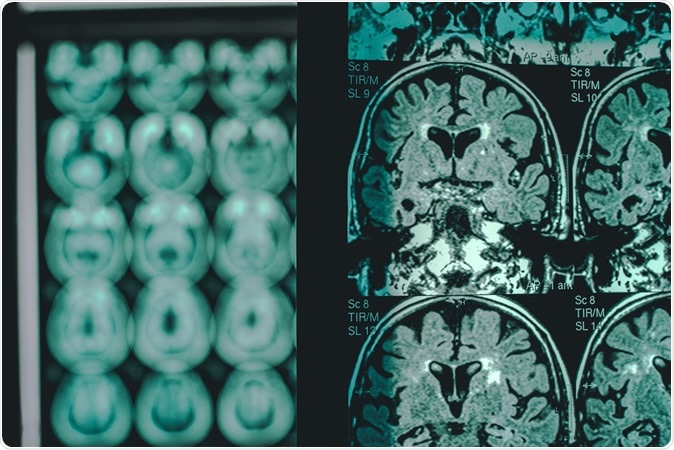Researchers from the ARTFL-LEFFTDS Longitudinal Frontotemporal Lobar Degeneration (ALLFTD) research consortium, have reported that a blood test could soon be an important diagnostic tool in detecting the abnormal proteins deposits in the brain that lead to the progressive and debilitating condition of Alzheimer's disease. The study titled, "Diagnostic value of plasma phosphorylated tau181 in Alzheimer's disease and frontotemporal lobar degeneration," was published in today's issue of the journal Nature Medicine.
This study funded by National Institutes of Health (NIH), National Institute of Neurological Disorders and Stroke (NINDS) and National Institute on Aging (NIA) worked on a biomarker in the blood connected to Alzheimer's disease called the phosphorylated-tau-181 (ptau181). The team explained that Alzheimer's disease typically begins with dementia and progressive forgetfulness with deposits of abnormal proteins in the brain called the tau proteins and tangles. Often the disease is detected after significant damage occurs to the brain, and symptoms are overt.

Alzheimer's disease shown on an MRI scan. Image Credit: Atthapon Raksthaput / Shutterstock
With this new test, patients with early stages of dementia could be detected, and appropriate treatment could be initiated, the team explained. Further, this blood test could be less invasive and costly compared to brain imaging studies and spinal fluid tests that are presently used for the detection of the disease. Brain images such as PET scans are the standard of diagnosing Alzheimer's disease at present, the team added. These scans and the spinal fluid tests can help detect abnormal tau proteins they wrote.
Expert view
Richard J. Hodes, M.D., director of NIH's NIA said in a statement, "The considerable time and resources required for screening research participants with PET scans and spinal taps slow the pace of enrolment for Alzheimer's disease treatment studies. The development of a blood test would enable us to rapidly screen a much larger and more diverse group of volunteers who wish to enroll in studies."
The Study
The study was led by Adam Boxer, M.D., Ph.D., at the University of California, San Francisco, whose team worked on detecting the levels of ptau181 in plasma. They collected blood samples from over 400 participants. These participants were from different studies, including the University of California, San Francisco Memory, and Aging Center, Advancing Research and Treatment for Frontotemporal Lobar Degeneration (ARTFL) consortium and another study funded by Eli Lilly.
Results and clinical implications
The study results showed that there was a significant increase in levels of ptau181 in patients who had Alzheimer's pathology, especially those with frontotemporal lobar degeneration (FTLD) – a rare form of neurodegeneration.
The study results were close to what was confirmed by ptai181 in the spinal fluids of the participants as well as PET scans showing abnormal protein deposits in the brain.
Roderick Corriveau, program director at NIH's NINDS, said in a statement, "It has become clear that there are many possible biological pathways to dementia. Finding a blood test that specifically identifies the presence of Alzheimer's pathology in the brain should greatly help researchers develop better treatments for the many who suffer from dementia."
Future directions
At present, the team of researchers is working on developing and improving the ptai181 blood test method so that it can replace the currently invasive tests. Eliezer Masliah, M.D., director of NIA's Division of Neuroscience, said in a statement, "Because of NIH's investments, we are poised to make dramatic advances in biomarker development for Alzheimer's disease, FTLD, and related neurodegenerative disorders."
The researchers and the experts supporting the study are all hopeful that soon this test and its principle could be used for the development of new and effective drugs to treat Alzheimer's disease.
Tiina Urv, program officer in the Office of Rare Diseases Research at the NIH's National Center for Advancing Translational Sciences (NCATS), in a statement said, "This research is an example of how studies on rare diseases, in this case, FTLD, may provide important insights into common disorders such as Alzheimer's disease, which affects millions of people."
Related study
On the 8th of January this year, a similar study was published in the journal Nature Communications, titled, "Clinically accurate diagnosis of Alzheimer's disease via multiplexed sensing of core biomarkers in human plasma."
In this study, the team used core biomarkers for Alzheimer's disease, including "t-tau, p-tau181, Aβ42, and Aβ40". To detect these biomarkers, the team used "densely aligned carbon nanotubes (CNTs)."
The CNTs helped detect the levels of the different tau proteins in the blood and successfully detected Alzheimer's patients from normal controls with the test sensitivity of 90 percent and selectivity of 90 percent. The average accuracy of the test was found to be 88.6 percent, wrote the researchers.
Journal reference:
Thijssen, E.H., La Joie, R., Wolf, A. et al. Diagnostic value of plasma phosphorylated tau181 in Alzheimer’s disease and frontotemporal lobar degeneration. Nat Med (2020). https://doi.org/10.1038/s41591-020-0762-2